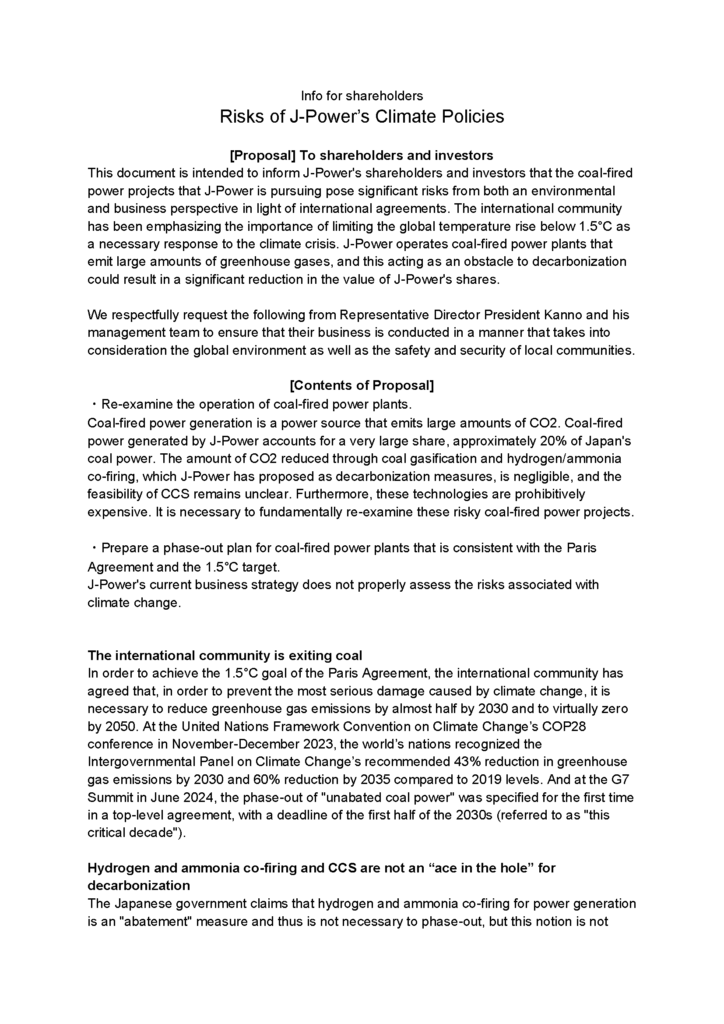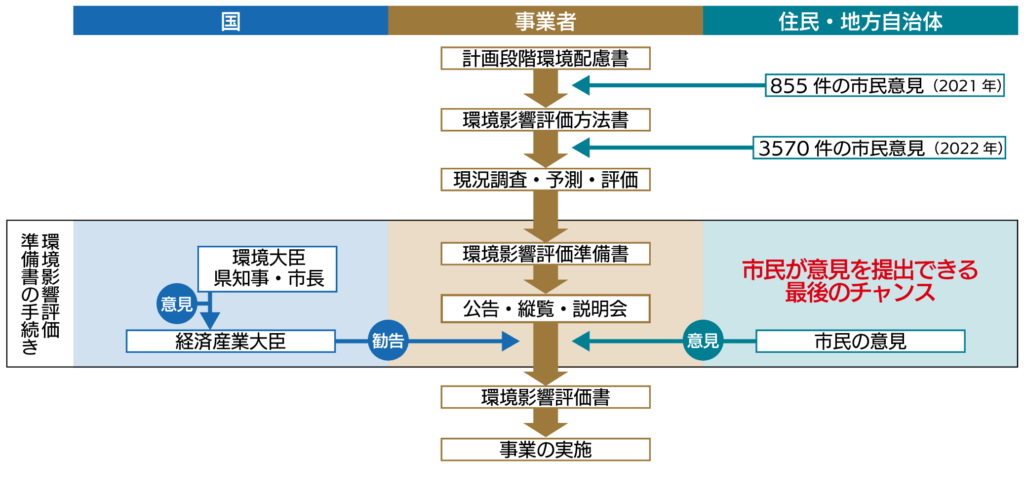News
【News】GENESIS Matsushima Project Environmental Assessment (Results of Submitted Comments on the Environmental Impact Assessment Methodology Document) (February 25, 2023)
【News】 Launch of ACT Matsushima, information platform on the GENESIS Matsushima Project (September 5, 2022)
Information/Documents
【Pamphlet】GENESIS Matsushima Project- An Overview and Issues

The GENESIS Matsushima Project pamphlet has been updated. It provides an overview of the project, which has been promoted by Japan Electric Power Development (J-Power), and highlights various issues associated with it, such as CO₂ emissions, air pollution control measures, and the shift to renewable energy.
Published: May 2022 / Revised: October 2025
Download (PDF)
【Pamphlet】Risks of J-Power's Climate Policies

This pamphlet was designed for distribution at J-Power's 72nd Ordinary General Meeting of Shareholders in 2024, but it provides useful information about the GENESIS Matsushima Project and the company's coal-fired power generation business. It explains the risks of J-Power's climate change measures to shareholders and investors who have already agreed to phase out coal-fired power plants. The pamphlet calls for a review of J-Power's coal-fired power generation business and the development of a coal-fired phase-out plan consistent with the Paris Agreement and the 1.5°C target.
Published : June 2024
FAQ
Followings are frequently asked questions about the GENESIS Matsushima project. (To be updated as needed)
-
What is the current status of GENESIS Matsushima Plan?
-
J-Power is now conducting the Present State Survey, Modeling, and Evaluation based on the Scoping Document.
J-Power is planning to begin construction in 2026 and start operation in FY2028.
-
What is the GENESIS Matsushima Project?
-
Currently, at Matsushima Thermal Power Station in Saikai City, Nagasaki Prefecture, two old and inefficient coal-fired power generation units have been in operation for more than 40 years (Unit 1 (500MW) started operation in January 1981 and Unit 2 (500MW) started operation in June of the same year).
J-Power, which owns the Matsushima Thermal Power Station, plans to add a coal gasification facility to Unit 2 of the plant to slightly improve its efficiency and continue its operation. In the future, the plant may become one of the key facility for co-firing ammonia, manufacturing coal-derived hydrogen, and Carbon Capture, Utilization, and Storage (CCUS), where CO2 captured from the flue gas associated with power generation will be transported to other areas for utilization or buried underground. Currently, J-Power is in the process of conducting an Environmental Impact Assessment (EIA) for this project.
-
Why is the GENESIS Matsushima Project a problem?
-
(1) It emits a lot of CO2 and accelerates global warming
The climate crisis is becoming more serious, and we must limit the increase in the earth's average temperature to within 1.5°C of pre-industrial levels to avoid a more dangerous climate. Countries around the world are required to achieve a carbon neutral society in 2050. Therefore, Japan, as a developed country, must phase out coal-fired power generation by 2030 (phase out). Coal-fired power generation is the energy source that emits the largest amount of CO2 among thermal power plants. It emits almost twice as much compared with natural gas in terms of CO2 emission intensity. It is also the largest source of greenhouse gas emissions in Japan's power generation sector.
(2) Continuous CO2 emissions in the future by extending the operation of aging power plants
If fully operational, the Matsushima coal-fired power plant will emit about 6 million tons of CO2 per year, which is an enormous amount, equivalent to about three-quarters of Nagasaki Prefecture's annual emissions of 7,839,000 tons (indirect emissions in FY 2018*). And even if the GENESIS Matsushima Plan is implemented, it will not lead to significant emission reductions. Nagasaki Prefecture has issued a carbon-neutral declaration to reduce greenhouse gas emissions to zero by 2050. Nevertheless, the continued emissions from aging power plants that have been in operation for more than 40 years is problematic because it undermines the efforts of Nagasaki Prefecture as a whole.

(3) Inadequate air pollution control and health impact raise concern
Coal, which is used as fuel, contains a variety of pollutants, and burning it emits air pollutants such as nitrogen oxides, sulfur oxides, and particulate matter. These can affect respiratory diseases such as asthma. They also lead to the formation of PM2.5, which pollutes the air.
Because the Matsushima Thermal Power Station is old, it emits higher concentrations of air pollutants than other coal-fired power plants, and its environmental measures are inadequate. This is a problem unique to thermal power plants that burn fossil fuels.
J-Power claims that the GENESIS Matsushima project will reduce emission concentrations, but the figures are still significantly higher than those of other power plants.
(4) A stumbling block to the introduction of renewable energies
At a time when there is an international call for a decarbonized society and a shift away from coal-fired thermal power generation, we must create a society that actively promotes the introduction of renewable energy sources such as solar and wind power, rather than coal-fired thermal power, which accelerates climate change. In the service area of Kyushu Electric Power Company, where Matsushima Thermal Power Station is located, the number of hours during which electricity generated from renewable energy sources exceeds power demand is increasing, and output control of solar and wind power is being implemented. In other words, prolonging the life of thermal power plants could be a stumbling block or a brake on renewable energy in the region, and J-Power should consider presenting a proposal that does not implement the project and more flexible operation of the power system.
Timeline of the GENESIS Matsushima EIA
| Date | Events |
| 2021 Apr.16 | J-Power announces they have began preparation for conducting environmental impact assessment for the GENESIS Matsushima Plan |
| Sep.28 | J-Power announces (in Japanese) they have submitted the Document on Primary Environmental Impact Consideration for GENESIS Matsushima Plan and begun public notification |
| Oct.15 | Call opened for submission of public comments on the Document on Primary Environmental Impact Consideration for the GENESIS Matsushima Plan |
| Oct.29 | 855 comments were collected and submitted to the J-Power in response to the call |
| Nov.12 | Nagasaki Prefecture releases the Governor’s opinion on the Document on Primary Environmental Impact Consideration for the GENESIS Matsushima Plan In the opinion, the governor allows the EIA to proceed to the next stage. Nonetheless, in response to the oppositions and concerns raised toward the Plan, he also advises the J-Power to provide information and explanation from the early stages of the project planning, and to consult with the local community in good faith. |
| Nov.26 | Webinar “Plan to extend the life of an aging power plant has emerged in Nagasaki - Problem of GENESIS Matsushima Plan and Youth Action” is held (Japanese) |
| Dec.9 | Press Release (in Japanese) is published by Kiko Network in advance of the submission of the Environment Minister’s opinion to the Ministry of Economy, Trade and Industry |
| Dec.16 | Ministry of the Environment submits the Minister’s opinion to the Minister of Economy, Trade and Industry Press Release (in Japanese) by Kiko Network on the Environment Minister’s opinion. |
| Dec.24 | Ministry of Economy, Trade and Industry releases the Minister’s opinion (in Japanese) on the Document on Primary Environmental Impact Consideration for the GENESIS Matsushima Plan In the opinion, he advises J-Power to introduce "carbon-free" alternative fuels such as biomass and ammonia as early as possible, to conform to Japan's new mid-term target for GHG reduction (46% reduction in FY2030 (compared to FY 2013)) and net-zero by 2050 as an utility overall, to reconsider the implementation of the Plan if a roadmap for carbon dioxide emission reduction cannot be drawn to meet the 2030 and 2050 national targets, to assess and conduct studies on the environmental impact of the operation of the existing power plant, and to fully take into account the opinions of local governments and involve local residents. |
| 2022 Jan.28 | Press Release (in Japanese) by Kiko Network on the Economy, Trade and Industry Minister’s opinion. |
| Mar.25 | Action is carried out in front of J-Power on the Day of Climate Action (Media coverage (in Japanese) (Buzzfeed)) |
| Jun.28 | Standing Action is carried out to coincide with Annual General Meeting of J-Power (Media Coverage (in Japanese)(Kanagawa Shimbun) |
| Jul.29 | Open Symposium “Climate Crisis and Crisis of Peace” is held at Nagasaki University (Event page) |
| Aug.30 | J-Power announces (in Japanese) that they have submitted and began public notification of the Draft of the Assessment Method (Scoping Document) for the GENESIS Matsushima Plan |
| Oct.3 | Public notification period of Draft of the Assessment Method (Scoping Document) for the GENESIS Matsushima Plan ends. 3,570 comments are submitted to J-Power after various organizations call for submissions (1, 2, 3). |
| Dec.22 | Nagasaki Prefecture releases the Governor’s opinion on the Draft of the Assessment Method (Scoping Document) for the GENESIS Matsushima Plan In the opinion, he advises J-Power to provide adequate explanations to local residents and others about the Plan, and to explain in detail the progress of the project to local residents and related organizations. Also he requests an estimate of carbon dioxide emission when the Plan is implemented. |
| 2023 Feb.24 | The Ministry of Economy, Trade and Industry released Minister’s notice (in Japanese) to the Draft of the Assessment Method (Scoping Document) for GENESIS Matsushima Plan, allowing the EIA of the Plan to proceed to the next stage. |
| Feb.25 | Result of the submission of comments on the Draft of the Assessment Method (Scoping Document) for the GENESIS Matsushima Plan(in Japanese) |
| Feb.26-27 | Screening of the film “NEWTOK” (Organized by Patagonia) and workshop “Let’ think Nagasaki’s “Zero Carbon” ~ Future of Nagasaki and Energy” (Organized by Kiko Network) is held |
| Mar.24 | Releases pamphlet "GENESIS Matsushima Project- An Overview and Issues" |
| Mar.3 | Submits public comment (in Japanese) on the Draft Action Plan for Global Warming Countermeasures (Regional Measures)of Saikai City |